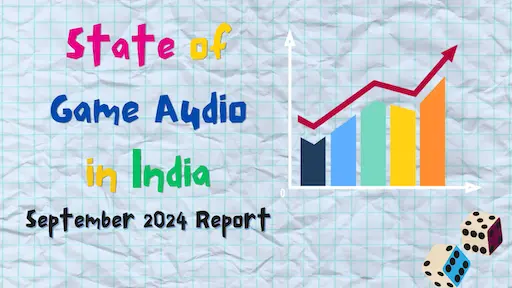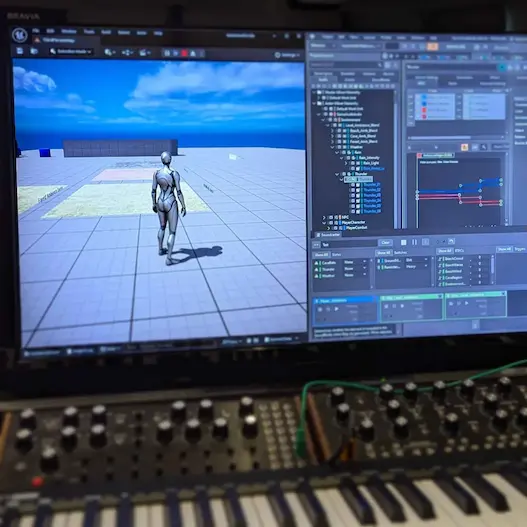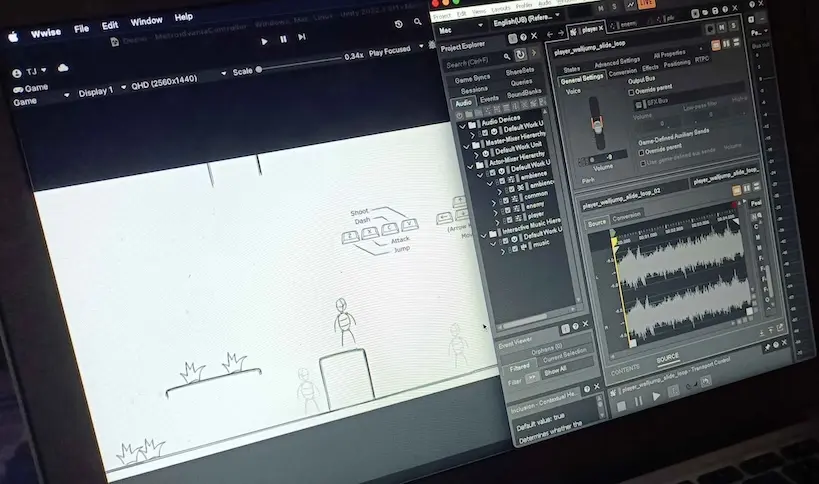State of Game Audio in India – Report from September 2024
Advertisement:
In order to gauge progress, it's important to do regular retrospective sessions and analyse what has worked, what did not, and plan the next realistic steps towards the desired outcome. In the context of games & interactive audio, my aim is to avoid falling for the hype and understand the situation on ground. While building the music, audio & game audio ecosystems in India, I've been doing quarterly reviews of where things have moved and I realised it might help to start publishing these observations on the internet in case someone finds it and would like to contribute. 💡 Read the previous report here: State of Game Audio in India - Report from June 2024 I'm excited to see that things are moving forward, steadily. More people (still in single digits, but more nonetheless) are learning game engines & middleware, watching tutorials, experimenting in game jams etc. Some have also made documentation part of their process, and I'm delighted to see such mindset upgrades. In terms of the initiatives at Game Audio India, I've been nudging such pioneers to take charge and own their contributions. On that note, the past couple of months have seen regular Community-led events. Starting with Raunak Barde, the sound designer for the game Raji, the idea was to make the game engine side of implementation visible. A lot of folks entering the game audio world have heard about Wwise & FMOD from the job descriptions they read, so they start watching tutorials of these middleware. But soon enough, the common question pops up: Now usually, this question would get answered if they learn further, but the blurry future makes most learners uncomfortable and they give up. So with Raunak's workshop on Wwise + Unreal Engine, our aim was to at least help everyone see exactly how trigger points and game states are set so that even if they wouldn't all of a sudden know the ins & outs of the implementation, they will at least know that it's worth learning further. To keep the streak active, I end up making a Host an Event form – a concept with 2 purposes: Tanay Jain is at the moment hosting the Unity + Wwise workshop and it's going great. While all this might sound like things are progressing well, let's take a look at the challenges: It's still a long way to go. While the audio & music tech industry has more people coming from IT or other corporate experience, the game audio industry's influx includes creatives working in the unorganised sector (yes, the Indian music industry is an unorganised sector).

"I understand that middleware allows us to create soundscapes to be played. But how do these actually get triggered in the game? How does the game actually send information to the middleware?"
1. Make it accessible for anyone to be able to use the Game Audio India platform to share knowledge
2. Make people better at communicating their ideas. As part of encouraging their efforts, I tend to reach out to everyone who I find putting in the hard work, to see if they would like to showcase what they have learnt. "I'm still learning" is the humble response they'd reply with, not realising that they already know far more than what anyone in the population 1+ Billion population knows! Once they have given the talk, they feel much more confident. "Thank you for nudging me to do this. I didn't know I could!"
1. Game Audio Implementation: Sound designers are still hesitant about getting into implementation. Most of them participate in sound design challenges, making assets for the 'video of the game' rather than trying the same in Unity or Wwise, for example. Understanding of lifecycle or execution order of objects in a game is poor (if not none). CPU vs RAM – the very basic knowledge necessary to create efficient audio experiences – is not explored, even after multiple nudges with an assumption that a game developer will handle it. This mindset comes from the fact that ~80% (if not more) of people creating audio assets in linear media industry never participate in the process of the final render of deliverables that actually goes out to the audience.
2. Diversity: The push isn't enough. Even with regular social media posts, demography is heavy male-dominated. There have been times when a workshop is going on and a female participant joins in, only to drop off within minutes after realising she's the only female there. We need to do far more than spreading of word, to change this. We need at least one example of success who will inspire everyone (unfortunately, this is still a strong way to make the industry appear more open). If you have more ideas on how we can do it better, please drop me an email: queries@prashantmishra.xyz
3. Comfort zone: People still want to live in the world of DAWs. At the moment a majority of sound designers and music composers in India don't even have the habit of organising their linear media projects properly, so a task as trivial as naming each exported sound effect properly, feels like a big deal to them. Documentation for them is almost as new as AR/VR to someone in the 1900s! There's no other way to say it: game audio is not an extension of linear media. It's as much more effort as you've already made so far in linear media. Get out of your comfort zones.
4. Self learning: Indian education system (and even the corporate system) has conditioned most people to be told what to do, which is why a huge part of the population does not learn anything new unless it's served to them as a structured curriculum. This is a major hinderance in game audio. Majority of enthusiasts, instead of just opening Wwise and experimenting, are waiting for a subpart sound engineering institute to build a course and hire someone who himself has no clue of game audio, to teach them. Only a handful (less than 10, or even 5!!) of people are doing the homework on their own.
5. Cultural shift: Indian film & sound industry is all about "secrets of the trade". The culture of collaboration is overpowered by the culture of snatching projects, safeguarding melodies & establishing power. Games are build in a completely different environment where each department not just sends each other memos but also collaborate in real time, every hour. Meeting once in a blue moon to give briefs or do reviews isn't enough here. This itself is a shocker to linear media folks. Almost like travelling to another country and getting surprised by the culture. Some folks like Raunak, Dhruv (with his game audio business workshop) and Tanay have come forward to share knowledge and have set the tone for others.
To see a better report in December 2024 and further, be a part of the change. I'm all ears for ideas. Feel free to reach out using the Contact Me page.
Written by Prashant Mishra
Audio Developer Conference (ADC) | Game Audio India | National Institute of Design | Music Hack Day India | Music Tech Community | Previously contributed to School of Video Game Audio
